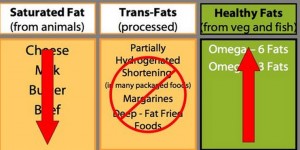 Many people believe that cutting dietary fats is the route to go in order to stay lean. However, this is not quite an accurate picture and despite what you’ve been told, fat isn’t always the bad guy when it comes to waistline wars.
Many people believe that cutting dietary fats is the route to go in order to stay lean. However, this is not quite an accurate picture and despite what you’ve been told, fat isn’t always the bad guy when it comes to waistline wars.
Truth is, dietary fats are also extremely important for success. When you go about your day to day activities, you can easily utilize dietary fat as a fuel source and in fact, this is actually preferable because then you will be sparing your glucose stores.
Futhermore, dietary fats have absolutely no influence on blood glucose levels so they’ll help to keep your energy level very stable over time. Combined with a good source of protein and your energy level will stay consistent for hours at a stretch.
Dietary fats also help to control your hunger levels because they break down incredibly slow in the body. If your diet consists of a carb based diet and you are keeping your dietary fat intake low you will very likely experience hunger on an ongoing basis. In fact, you may find that you are always hungry.
In general, dietary fats should be kept at no lower than 15-20% of your total calorie intake for a rough guideline. This can be adjusted slightly higher if you feel you function better on a higher fat/moderate carb approach.
It is very important that you are choosing your dietary fats properly. If you eat the wrong fats, you could easily set yourself up for numerous health concerns and problems down the road.
The fats you should primarily be eating are: unsaturated fats, polyunsaturated fats and essential fatty acids (or omega fats as they are often called).
These fats boost heart health, improve your body composition and help keep your hormone levels normalized in the body while making sure that you feel your best at all times.
Examples of these types of fats include:
- Nuts and natural nut butters
- Seeds
- Flaxseeds and flaxseed oil
- Olive oil
- Coconut oil
- Avocado
- Fatty sources of fish (Omega3)
If you eat these most often, you will be on your way to maximizing your health while boosting your performance.
Make sure to avoid unhealthy sources of fats such as saturated (questionable fats) and trans fats (the villains) which are found in high fat dairy products, processed meats, fattier cuts of meat and many processed, convenient or fast foods.
Dieting is not about cutting out things…rather it is about making the correct choices and it’s no different when dealing with fat in our diets. It is not about cutting out fat completely, it’s about educating ourselves and making the healthy choice. It’s about replacing the “bad” stuff…the bad fats with health promoting ones.
Healthy fats even play a role in mental attitude and moods, help to control your weight and fight fatigue.
Bottom line is this, bad fats are bad for you…they increase cholesterol levels and the risk of disease while good fats not only protect your heart, they support your overall health and vitality. Good fats are essential to physical and emotional health.
Bear in mind too that just because a label says “fat-free” does not mean it is good for you nor does it mean that you can eat as much as you want without suffering consequences to your waistlines. Many “fat-free” foods are high calories because they contain lots of sugar and refined carbohydrates.
Just lowering the amount of fats you consume is not the answer, it is the mix of fats (eating more good than bad fats) that you eat that is the real key.
You can improve the health of your mind and your body and break free of any type of yo-yo dieting that may be frustrating your efforts to take weight off and keep it off in “Rebound Free Weight Loss” …as I like to say…it’s not about eating less, it’s about eating better!
Speak Your Mind